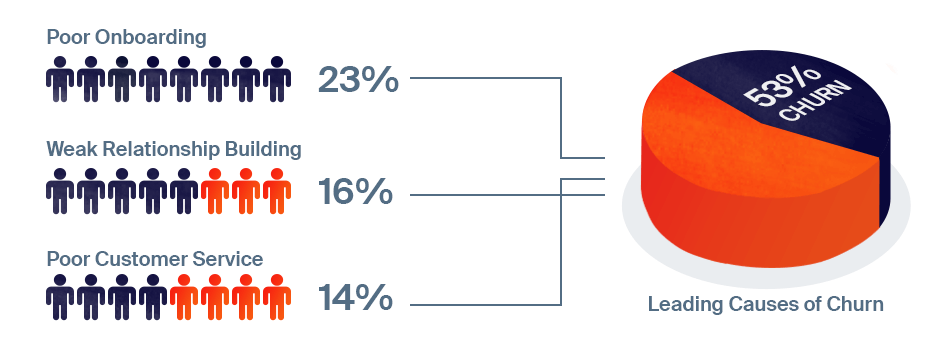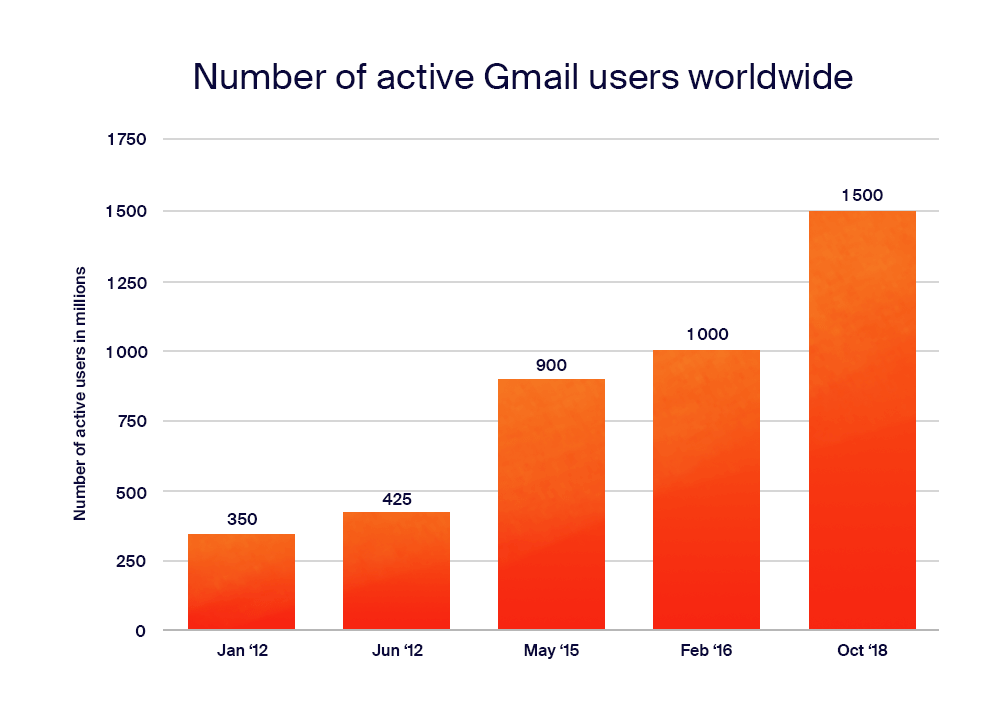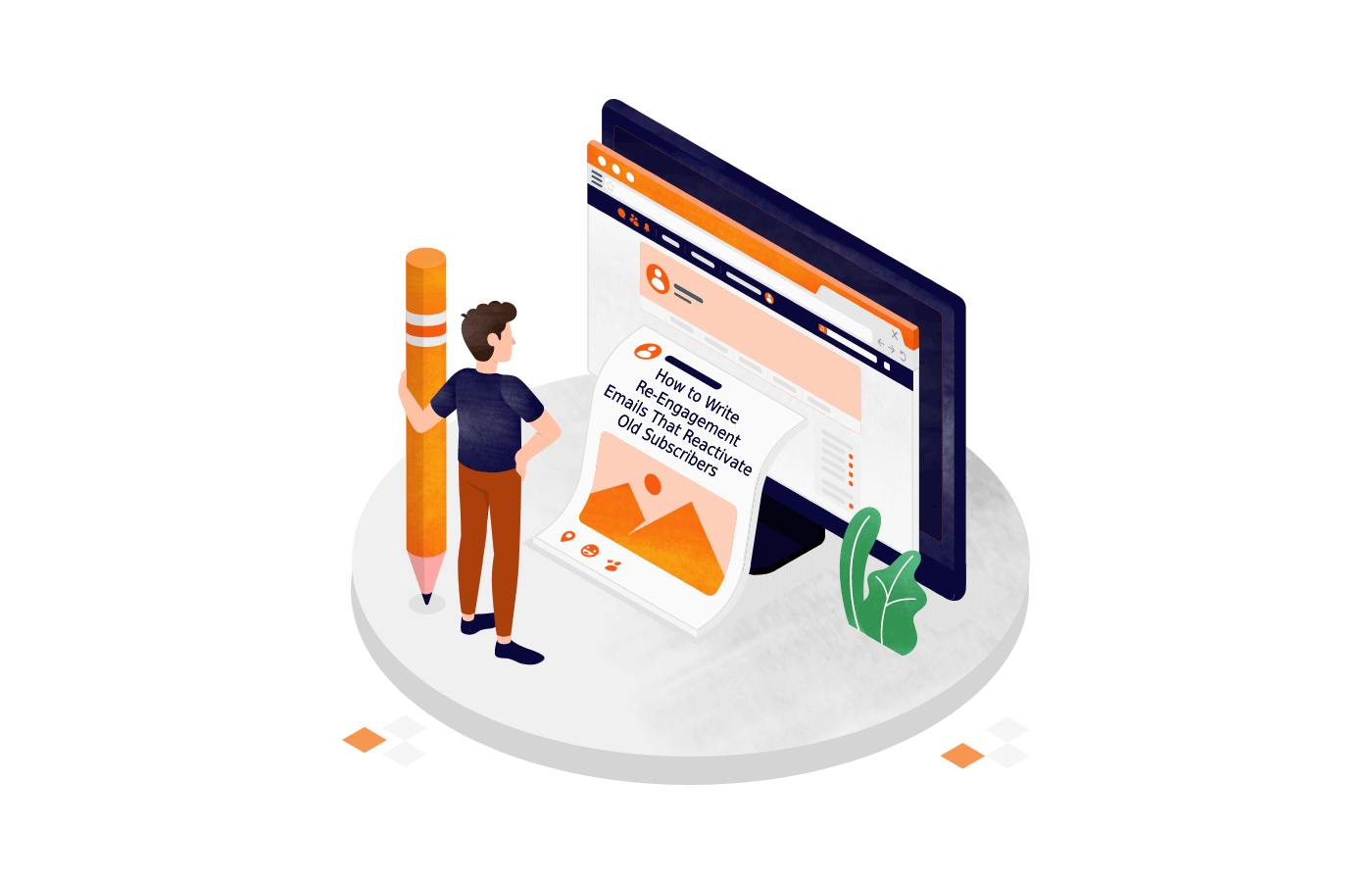Nowadays, the SaaS (Software as a Service) business model has become one of the fastest growing and most successful industries in the world.
According to sources like Virayo, the SaaS sector has experienced an exponential growth. Nowadays, the number of SaaS companies operating around the world is estimated to be around 11,000.
Moreover, the SaaS industry as a whole is believed to be worth a whopping 157 billion US dollars in 2020. If you think that number is high then you will be impressed to hear that by 2023 the SaaS market is estimated to reach a staggering value of 623 billion US dollars.
This rapid increase in SaaS digital companies offering subscription-based services has made competition as ferocious as ever. Due to the large number of competitors in the market, keeping subscribers engaged and satisfied is now harder than ever.
As a result, most SaaS businesses end up suffering from the dreaded consequences of disengaged subscribers: churn. Your churn rate is calculated by dividing the number of customers that have left by the total number of customers, plus the amount of new subscribers that you have gained that month.
This is often expressed as a ratio but can also be presented as a percentage when multiplied by 100. Industry experts like Retently point out that more than half of SaaS users end up disengaging and churning out.

According to Retently, 53% of customers unsubscribe for three major reasons: poor onboarding, weak relationship building, and poor customer service.
As you can see, in this day and age, keeping customers active, and re-engaging with old subscribers who have churned is vital in order to survive.
If you are reading this, then you are probably worried about the risks involved with not being able to keep subscribers and, even worse, failing to reconnect with former users.
Luckily, there are some easy tips that can help you develop a stronger bond with old subscribers, boosting customer retention along the way.
Thanks to the many advancements made in telecommunication software – like video conferencing tools – many businesses have been able to carry on working during the COVID-19 pandemic.
This shift towards remote work has helped many companies avoid the disastrous consequences of a total work stoppage. Well, here is the good news: those same principles that can be applied in order to maintain client relationships remotely can be used to re-engage former customers, too.
The power of re-engagement emails
With all that introduction out of the way, let’s start working towards an email re-engagement strategy that helps you reconnect with those old subscribers.
Let’s get your first question out of the way: “Why emails?”. Well, put simply, it is still the most popular and used method of digital communication. According to sources like Statista; in 2018 the number of active Gmail users amounted to a whopping 1.5 billion people.
In the digital era, emails have completely taken over as our main form of communication, especially for business-related interactions. Do you remember the last time you went more than 24 hours without looking at your inbox? The most likely answer is a resounding no.
Although emails are widely popular, their effectiveness can be made redundant once subscribers leave a company. However, businesses looking to reconnect with those former customers can do so by retrieving their contact details through a quick email address search.

Understand what went wrong
In order to craft the perfect re-engagement email, you must understand why your subscribers are going dark on you. There are many reasons as to why subscribers may stop paying attention to your service. However, no matter what their reason is, you must be willing to act as an active listener, especially when you have done things wrong.
This will not only help your users feel validated, but it may also entice them to give your service another opportunity, activating those guilt buttons that may make them feel uncomfortable about unsubscribing. Don’t be afraid to ask for feedback, sending emails with satisfaction surveys can help you learn from these mistakes in order to develop a stronger relationship with your customers and avoid churn in the future.
Types of re-engagement emails
Now it’s time to get to the nitty gritty. Creating different types of re-engagement emails that can help you reconnect with old subscribers is a tricky endeavor, but developing subtle ways to re-engage old users can help you turn the tide when churn rates get dangerously high. A re-engagement email campaign can take many forms:
Onboarding emails
What’s onboarding? Put simply, onboarding techniques are used to help users find value in your product. User onboarding allows SaaS companies to showcase what their apps or services can truly do. These types of emails can help you reconnect with old subscribers that have fallen off the wagon and have lost contact with your software.
Onboarding emails can take many forms: tutorials, product guides, tips, etc. Although this engagement strategy is usually used with newer users, it can be easily implemented with older subscribers, especially in scenarios where there are some big changes or updates that fundamentally affect your users’ relationship with the service.
As has been mentioned before, poor onboarding is one of the key reasons that push SaaS users to churn. However, companies can get back in contact with former subscribers in order to ensure that those mistakes are fully fixed.
Remember how we talked about the importance of feedback? If your old users state that they stopped using your services due to a lack of understanding, you can send them emails explaining how you have updated your onboarding process. This will not only make them question their decision to churn, it will also show that you listen to their concerns.
Cybersecurity-related updates
This is another subtle way to reconnect with dormant users in a non-invasive way that doesn’t come off as desperate. As you already know, it is essential to keep your security protocols up to date. Giving your clients updates regarding PCI DSS (Payment Card Industry Data Security Standards) can help you remind them just how amazing your service is.
You can craft these messages in order to include some one-use codes that allow you to check their data, or some captcha designed to prove that they are real people. Maintaining PCI security standards is essential in the digital era, especially in B2B scenarios where the sensitive data could affect multiple enterprises.
New offers and deals
You can also send emails regarding discounts, deals, and offers, in order to get in touch with old subscribers. This strategy can also be used to remind clients that they are missing out by not using your service.
Additionally, you can make these messages even more effective by creating a sense of urgency around the offers with countdown timers that work as interactive CTA buttons and engage with subscribers directly.
Setting up these special deals for a limited amount of time (like 24 hours, for example), will better your chance of re-engaging users. Ecommerce brands like Shopify use these kinds of neuromarketing techniques. Timers and countdowns are used to create a sense of urgency and scarcity around offers.
Embrace email automation for re-engagement
Email automation is a very powerful and efficient tool that can also help SaaS companies re-engage with old subscribers. Regardless of what type of message you decide to go with, you can always implement automated resources in order to send more messages effectively. This allows companies to reduce costs and allow support agents to use their limited time more efficiently.
Email marketing is not the only aspect of your company that can be improved thanks to RPA software. RPA – commonly known as Robotic Process Automation – is also used with other forms of customer service like IVR (Interactive Voice Response) systems, designed to route any inbound call made by a client to the right department, in order to save time.
Manners matter
Last but not least, let’s approach another of the major points regarding how to write re-engagement emails: the ever-important email etiquette. As it has been stated before, emails have become our major communication channel during the digital era. As any other form of communication, this practice has developed its own unspoken rules.
First and foremost, there is the topic of length. Your emails should be short and straight to the point, and your subject lines have to be engaging, eye-catching, and hard to miss. In essence, the most important thing about writing re-engaging emails is giving your reader as much information as possible, without any filler or time-wasting fluff.
Secondly, it is essential to strike a balance that allows you to keep a professional profile while being close and personal with your clients. One simple way to do so is avoiding using generic messages or sending emails using the “reply all” feature. As time-saving as it can be, it gives customers a very bad look.
Lastly, it is important to create a friendly tone. It is widely accepted that, more often than not, users that churn out tend not to want to hear back from the companies they used to work with. However, digital companies can implement the expertise of their customer service teams as specialized re-engagers. The same principles of kindness and patience that are applied in conversational support blogs can be used in order to develop re-engagement messages.
Be (re-)engaging & win back business
You may think that a customer who’s churned is more difficult to win back than a brand new prospect is to win over. That’s not, however, the case. If you leverage the power of email, choose a re-engagement strategy that suits your business, embrace automation, and ace email etiquette, you’ll bring those old subscribers back into the fold.
About author
Sunny Dhami is the Senior Director, EMEA Product Marketing & GTM for RingCentral. He has extensive Marketing experience across SaaS, Telecommunications and Technology sectors within companies such as Vodafone, Reed Elsevier, Calor Gas and SapientNitro. Sunny has also written for websites such as Hubspot.
